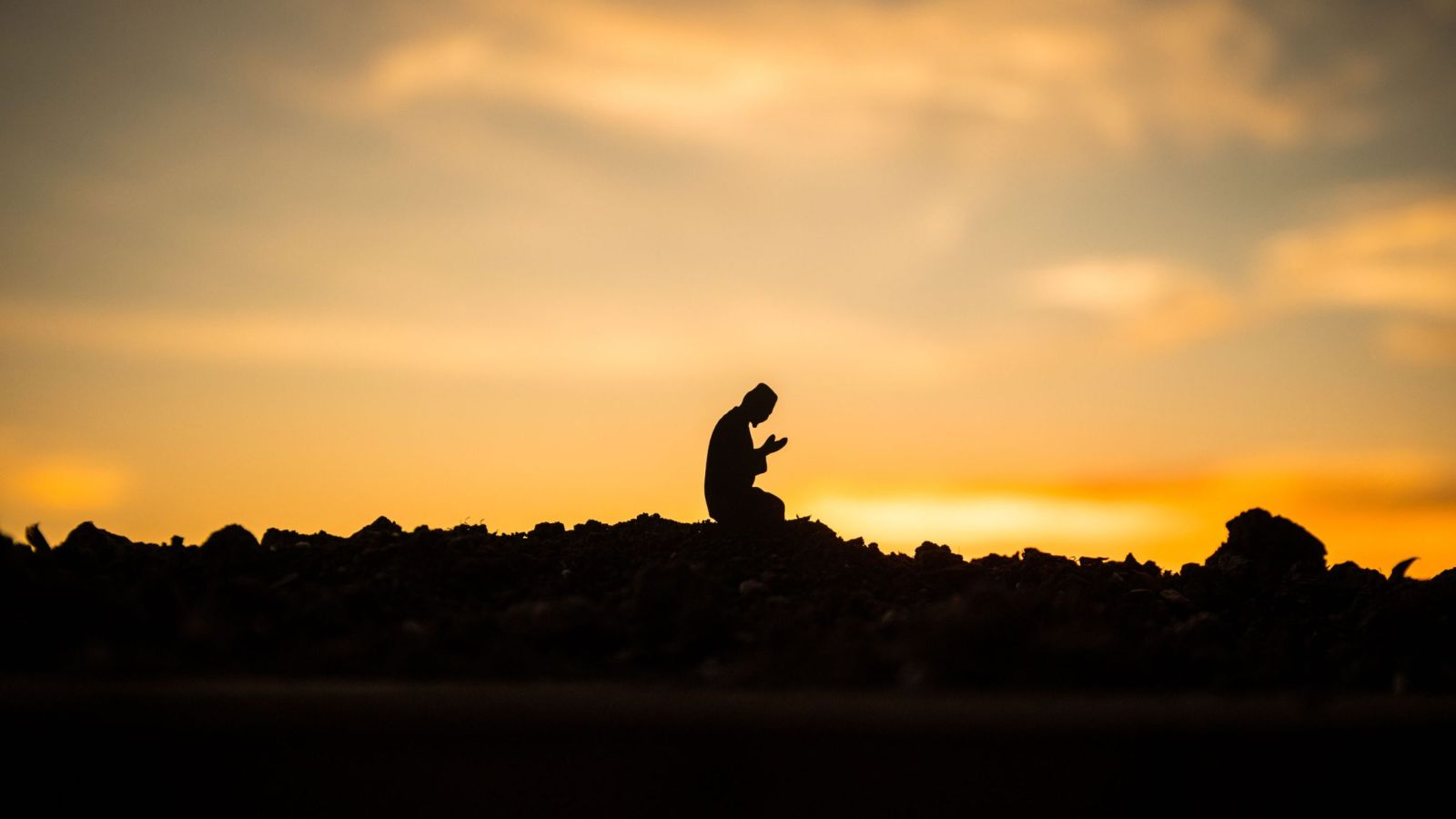The Course of Action When Unsure Whether Prayer Time Has Begun
Imām Muḥammad ibn Ṣāliḥ al-ʿUthaymīn


Praying Should Be Based on Confidence in the Prayer Time’s Arrival
One should not pray until he is confident that the time for ṣalāh has begun. That is, it is permissible for a person who intends to pray to commence the performance of the ṣalāh provided he is confident that the time for that ṣalāh has begun. For example, if the weather is cloudless and bright to where we are fully able to see that the sun has set, we may commence the performance of Maghrib. If, however, the weather is cloudy to where we are unable to see the sun, but we are almost certain that it has set, then we may commence the ṣalāh. This represents commencement of prayer based on what is close to certainty.
Evidence to Support Acting upon Near Certainty of the Prayer Time’s Arrival
As for the first scenario, its evidence is plainly evident [in the form of a clear sunset]. As for the second scenario of praying based upon what we are almost certain regarding, its evidence is that the Prophet (صلى الله عليه وسلم) and his companions broke their fast based on near certainty of the occurrence of sunset. This was narrated in the ḥadīth of Asmāʾ bint Abī Bakr (رضي الله عنها) who said: “We broke our fast during the time of the Prophet (صلى الله عليه وسلم) on a cloudy day. Then, the sun became apparent to us.” Narrated by al-Bukhārī1. Here, they broke their fast based on near certainty, not complete assuredness. So, if it was permissible to act in accordance with near certainty when assessing the conclusion of the fasting period, then it is similarly permissible to act in accordance with near certainty in the assessment of the start of the time for a particular ṣalāh. Rather, this would also mean that if they had prayed Maghrib following the conclusion of their fast, their ṣalāh would have been deemed correct unless proven otherwise.
[Q]: Should one pray while in a state of doubt concerning whether the time for that prayer has commenced?
[A]: He should not pray while he is doubtful. This is because the original, baseline state for this matter is that the time has not begun until proven otherwise by a clear, legislative directive that proves ṣālāh may be performed.
[Q]: Should one pray while he is almost certain that the time for ṣalāh has not begun?
[A]: It is even more obvious that he should not pray in this circumstance either.
[Q]: If he is completely certain that the time has not begun?
[A]: It is impermissible for him to pray.
The Five Situations Relating to Knowing the Time For Prayer and Their Courses of Action
In summary, he should not pray in three situations and only pray in two. Altogether there are five scenarios:
He Should Pray:
- complete certainty of the commencement of the time for prayer
- near certainty of its commencement
These are the two scenarios in which one may commence the ṣalāh. In the second, if it was to become clear to him afterwards that he had prayed before the time, then he must pray that ṣalāh again and the ṣalāh he had prayed will be considered nafl (supererogatory).
He Should Not Pray:
- doubtful of the commencement of the time for prayer
- near certainty that the time for prayer has not begun
- complete certainty that it has not begun
These are the three circumstances wherein one should not pray.
Also, this issue shows us that there is due consideration attributable to near certainty with regards to actions of worship. There are also other acts of worship that may not be performed except with complete certainty. However, there are a considerable number of acts that may be performed based solely on near certainty. To the extent that we may derive a rule for acts of worship: ‘acts of worship may be based on near certainty’. For this reason, if a person has doubts concerning the number of rakʿahs that he has prayed, then the most correct opinion is that he acts in accordance with the number concerning which he is almost certain.
The Opinion of the Ḥanbalī Madh`hab
The opinion of the Ḥanbalī madh`hab is that: he should only act based upon complete certainty. For example, if a person has doubts regarding the number of circuits he has completed when performing ṭawāf or saʿī [during ʿUmrah or Ḥajj], then he should base all subsequent action on that which he has near certainty of, if a number seems most probable to him. If no number seems most probable to him, then he should base his subsequent action on the number which he is completely certain of (completing).
The Means of “Achieving Near Certainty” of Prayer Timings
As for the means by which one may achieve near certainty, they are:
- Applying judicial reasoning and strife provided the one doing so is equipped with the tools that would facilitate such reasoning. He should be knowledgeable of that which acts as an indicator for the start of the (prayer) time. If he is ignorant of such indicators, then he may not act in accordance with any reasoning he puts forward, as he is not among the people of judicial strife. For example, if a person after having prayed Ẓuhr, wants to pray ʿAṣr. So, he says: ‘I shall pray ʿAṣr whenever is exactly half the time between Ẓuhr and Maghrib’. So, at the halfway point between the two, he prays ʿAṣr. Such a person has based his actions on a judicial base that is completely false. He would have to re-pray ʿAṣr if it is clarified to him that he has prayed before the time. Similarly, with regards to Ṣalāh al-ʿIshāʾ, if one prays it when he sees the strong, radiant rays of the sun have disappeared but the red evening glow is still present in the sky, his ṣalāh would be deemed incorrect. This is because he has prayed before the commencement of the time, and additionally he is not among the people that may put forward any meaningful judicial strife in this matter. As he is unaware of the conclusion of Maghrib time and the commencement of the time for ʿIshāʾ.
- Information from a trustworthy source who is certain. That is, in the form of information provided by another. For example, a man relates to you that the time for ṣalāh has begun. This provided information is based in certainty, by him saying: ‘I saw the sunset’ or ‘I saw the breaking of the dawn’. If the information provided by another is based on his own judicial strife or near certainty, then you should refrain from acting in accordance with his statement. This is the opinion of the composer [Al-Ḥajjawī].
[Q]: Is it not permissible for a person to base his actions on that which he himself is nearly certain regarding or on his own judicial strife?
[A]: Of course, but in this situation, he is basing his action on information provided to him by another. That which branches off is always deemed weaker than the base. If a person bases his actions on his own judicial strife, this may be considered to be the base or origin. Whilst basing his actions on the information provided to him by another is considered a branch or subsidiary.
[Q]: If this other person was to say: ‘I think the sun has set’, should one base his actions on this?
[A]: He should not act in accordance with it. This is the stance taken by the composer.
‘Trustworthy’ here means: one whose statements are trustworthy due to him having reached the age of maturity and responsibility [for Islamic duties like prayer], a person known to be truthful in speech. That is, he is both mature and intelligent, not known as a liar, nor by hastiness or heedlessness.
The Opinion of Shaykh Ibn ʿUthaymīn Regarding the News of the Trustworthy on Prayer Times
This stance taken by the composer that the news provided by another must be based on certainty, and that the person must be trustworthy, requires some reconsideration. The correct stance in this issue: If a person who you trust provides you with information concerning the commencement of the time for prayer, you may act in accordance with his statement regardless of whether the information he relates is based in certainty or near certainty. This is because if you are ignorant of the time of ṣalah yourself, then we command you not to act in accordance with another who is able to put forward judicial strife in this issue, this would be the source of great hardship. Furthermore, Muslims have always acted in accordance with the call of the muʾadhins even though many of them may sometimes issue their call based on near certainty, due to the high frequency of overcast weather. Also, they may not have watches with which they are able to properly inspect the time.
To summarise, a person may know the start of the time for prayer either by his own efforts provided he is among the people that is able to put forward such effort—that is, he is knowledgeable of the start and conclusion of each respective prayer time period. He may also know the time for prayer from news provided by another whose news he regards as trustworthy regardless of whether the statements provided by this person emanate from complete or near certainty.
The Ruling of Receiving News of the Prayer Time Provided by a Trustworthy Woman
Also, the news provided by the trustworthy would also apply to a woman. That is, if a trustworthy woman was to inform you of the start of the prayer time you should act in accordance with the news provided by her. As this would fall under religious information or news, rather than a legal testimony [which would require a minimum of two women under Islamic law].
Endnotes:
1. Authentic: narrated by al-Bukhārī: 1959.
Source: Al-Sharḥ al-Mumtiʿ 2:122-126
Translated by: Riyāḍ al-Kanadī

















